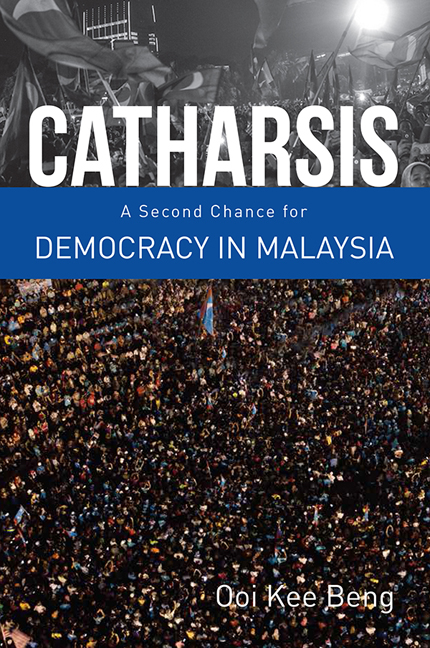Book contents
- Frontmatter
- Contents
- Foreword
- 1 Introduction – Malaysia's Future Is Redeemed
- Before Pakatan Harapan
- Before 9 May 2018
- With Mahathir at the Helm
- 31 One Thing Is Certain—There Will Be More Amendments to the Constitution
- 32 The More Things Change, the More Things May Actually Change
- 33 Did Merdeka Liberate or Create Malaya?
- 34 Interview with Nurul Izzah Anwar: Rebuilding a Nation Long Divided
- 35 The Diminishing of Humans Through Identity Politics
- 36 The Art of Dismantling Cultural Pluralism
- 37 No Need to Let Bigots Dictate Policy
- 38 What the Penang Floods Say About Malaysian Politics (and It's Not Just About Climate Change)
- 39 This is the Moment of Truth for Malaysia's Race-based Politics
- 40 We are Equal Only Through Our Vote
- 41 Why the Opposition Has a Shot at Toppling the Barisan Nasional with Mahathir at the Helm
- 42 Spiralling Back towards Reformasi
- 43 Individual Freedom Is a Matter of National Survival
- 44 Why Meet the Twenty-first Century with Twentieth Century Mindsets?
- 45 A Final Quarrel between a Repentant Grandfather and Oldfashioned Self-absorbed Parents
- 46 Outraged Enough to Go Vote or Cynical Enough to Stay Home?
- Beyond 9 May 2018
- About the Author
40 - We are Equal Only Through Our Vote
from With Mahathir at the Helm
Published online by Cambridge University Press: 12 February 2019
- Frontmatter
- Contents
- Foreword
- 1 Introduction – Malaysia's Future Is Redeemed
- Before Pakatan Harapan
- Before 9 May 2018
- With Mahathir at the Helm
- 31 One Thing Is Certain—There Will Be More Amendments to the Constitution
- 32 The More Things Change, the More Things May Actually Change
- 33 Did Merdeka Liberate or Create Malaya?
- 34 Interview with Nurul Izzah Anwar: Rebuilding a Nation Long Divided
- 35 The Diminishing of Humans Through Identity Politics
- 36 The Art of Dismantling Cultural Pluralism
- 37 No Need to Let Bigots Dictate Policy
- 38 What the Penang Floods Say About Malaysian Politics (and It's Not Just About Climate Change)
- 39 This is the Moment of Truth for Malaysia's Race-based Politics
- 40 We are Equal Only Through Our Vote
- 41 Why the Opposition Has a Shot at Toppling the Barisan Nasional with Mahathir at the Helm
- 42 Spiralling Back towards Reformasi
- 43 Individual Freedom Is a Matter of National Survival
- 44 Why Meet the Twenty-first Century with Twentieth Century Mindsets?
- 45 A Final Quarrel between a Repentant Grandfather and Oldfashioned Self-absorbed Parents
- 46 Outraged Enough to Go Vote or Cynical Enough to Stay Home?
- Beyond 9 May 2018
- About the Author
Summary
Freedom cannot be understood apart from power. Like with all good dichotomies, it is never clear where the one turns into the other or lives off the other.
Today, it is a staple in management courses and sloganeering to talk about empowering employees. ‘Empower’ is also a term used from below. Empowering minorities, empowering women and empowering the poor all sound fine because we assume an extreme victimhood among these groups.
We do not talk as easily about empowering those who are already in positions of power or those who are obviously not victims of someone else's power. We do that only in relation to a bigger power that they have to suffer. We do not, logically, talk about empowering somebody who has absolute power and only do that when it comes to those who are very weak. Those who are not very weak, we do not consider empowering too much for fear that they quickly become suppressors in turn.
After all, we do assume someone or some group having the power to empower others. Thus, an authoritarian cannot logically be empowered further, at least within his realm.
From this, we see that Freedom and Power have arms locked, conceptually. Freedom has a context and that context is the inevitable contest for relative power. That is why we consider the notion and the institutionalising of checks and balances to be so important. It is wrong to think of it simply as the result of democratic thinking. The Magna Carta, seen by Anglo-Saxon thinkers as the starting shot for the curbing of the powers of the English monarch was a check on the king and a balancing of powers between his house and those of the nobles. Nothing very democratic there.
What it did show was that absolute power carries its own demise within itself, in that it leads to revolt at some level, and so, to protect the status quo, power must be curbed and shared among a few.
The point to remember is that power is not shared, and cannot be shared, equally among all within the realm. That would in fact be tantamount to the dissolving of power altogether, which we know is not a stable or possible situation. Power will instantaneously rise again the way warlords arose the minute a Chinese dynasty fell.
- Type
- Chapter
- Information
- CatharsisA Second Chance for Democracy in Malaysia, pp. 153 - 155Publisher: ISEAS–Yusof Ishak InstitutePrint publication year: 2018

